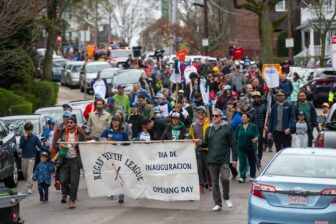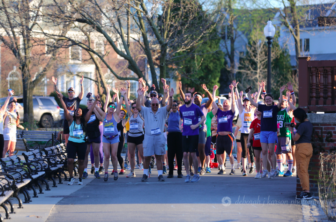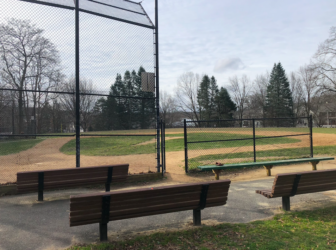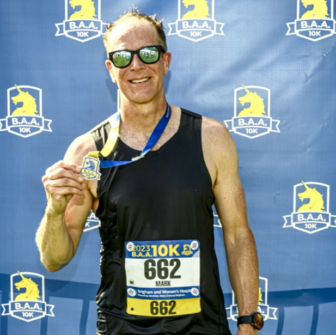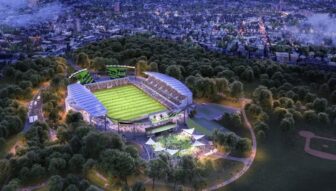Last updated on July 2, 2015

A Tuesday Boston 2024 community meeting went off-script and off-agenda when activists opposed to the games demanded their grievances be heard by city and Olympic officials.
By 6 p.m. activists had gathered outside English High School in Jamaica Plain with signs reading “Don’t Play With JP.”
‘Why Can’t We Just Do Projects That Will Help?’
One protester, member of No Boston Olympics Claire Blechman, of Somerville, said she thinks the Olympics would invariably overrun its budget, destabilize Boston communities, and lead to increased police presence. Blechman also said she wished the city of Boston would commit to making improvements to its infrastructure without the glitz and glam of the Olympic games as its sole motivator.
“Why can’t we just do projects that will help? If we need a better transportation system, why can’t we just build better transportation system without throwing a three week party for the global elite?” she said. “I think that Boston is already a world class city. We already have a legacy, we have such history here.”
The meeting began with Kent Knight of Manfredi Architects, a principal firm to the Boston 2024 design team, providing a brief summary of proposal 2.0.
Knight described the games’ expansion of the Emerald Necklace and the development of a new Boston “neighborhood” in Widett circle dubbed Midtown. Midtown, which Knight said today is a “collection of properties that has no real identity,” would be home to 69,000 seat temporary stadium that would be broken down following the games, its footprint converted to a public park.
New housing units, office, and retail space in Midtown would combine to create a mixed-use community which would increase Boston’s tax base and city revenue for years to come, Knight said.
“The games are not an end, but a means to achieve smart development,” said Knight.

‘You Lie!’
When John FitzGerald of the Boston Redevelopment Authority tried to assure residents that there would be no new structures built in Franklin Park, whose White Stadium is proposed to be renovated and used for the equestrian and pentathlon events, the audience of over 200 people — comprised of a vocal opposition and much more reserved cohort of supporters — erupted.
“You lie!” shouted one anti-Olympic activist. “We live here!” shouted another. “Secrecy is not mercy!” called out another still.
Some protesters perceived the meeting’s format—an introduction followed by the breaking off of attendees into three groups to discuss transportation, neighborhood planning and “open space legacy” accordingly—as a way for Olympic sympathizers to fragment the opposition and weaken their message.
“It seems like they don’t want everyone to have all the information,” said protester Cole Rainey-Slavick. “It seems like this is the first meeting where they’ve had large public opposition, and had the opposition being really vocal and very unified. They don’t want a large open scale public discussion, they want to separate people.”
Most of the protesters remained in the auditorium, pressing city officials on their myriad concerns related to the Olympic bid.
One audience member echoed Boston City Councilor Tito Jackson’s call for Boston 2024 to release the un-redacted version 1.0 including chapters 5 and 6, which the firm continues to withhold from public review citing a previously existing non-disclosure agreement with its contractors.
FitzGerald said he could not promise the full release of version 1.0. He also said that no taxpayer money had yet been used in planning Boston’s Olympic bid.

In response to one person’s concern that proposed renovations to Franklin Park would increase taxes for Jamaica Plain homeowners, Robert Rottenbucher of the Boston Parks and Recreation Department made the important distinction between capital dollars and operating dollars.
Capital dollars, said Rottenbucher, are the initial investment needed to build a public good—like a park or green space—and are often privately funded or donated. Operating dollars, on the other hand, are generated by taxes and go to the maintenance of a public good.
Rottenbucher said that private developers would be paying for the Olympic upgrades, while the city would continue to pay for their upkeep with money from their tax base, as they do today.
“As part of the parks department I go after every single private dollar I can get my hands on,” said Rottenbucher.
Rottenbucher did not say whether these proposed upgrades would require a larger operating budget.
Pro-Olympics Voices Also Present
Not all in attendance were opposed to the Olympic bid, and many could be seen holding signs that read, “I believe in Boston 2024.”
Kerry Castor of West Roxbury said she came to the Wednesday meeting in support of her children who love the Olympics, and are excited that they might be held in their very own hometown. Castor also said the Olympics will stimulate the economy and the job market, and bring an eventual 700 additional units of senior housing.
Castor said, “Why would we give up this great opportunity? It’s a once in a lifetime. Why give it to Los Angeles when we can make the profit off of it.”
Enerio “Tony” Barros, a longtime resident of Jamaica Plain who now lives in Hyde Park, said the Olympics can catalyze some much-needed development.
“I believe this represents a visionary opportunity of actually taking care of a number of items that are necessary to the city of Boston,” said Barros, a key advisor to Mayor Marty Walsh and longtime confidant of former Mayor Tom Menino. “And a good way is to use the Olympics as a resource. I honestly believe that the city of Boston deserves a good shot on this.”
[Editor’s note: The original post incorrectly identified a speaker.]


